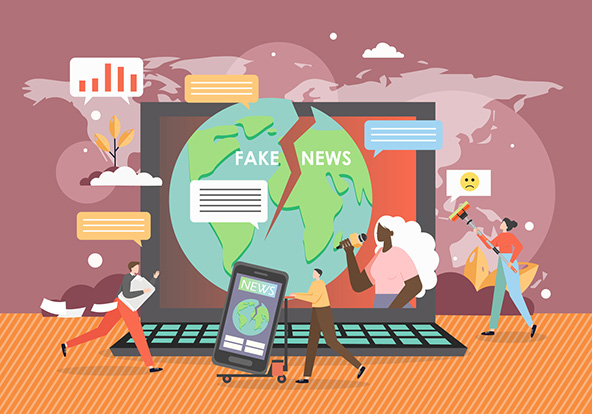In the digital age, the power of social media is undeniable. It has revolutionized the way we communicate, share information, and connect with the world. However, with great power comes great responsibility, and one of the most pressing issues arising from this technological revolution is the ease with which people can be misled into believing untrue stories. Here, we delve into how social media has become a fertile ground for the spread of misinformation.
- Virality and Echo Chambers:
Social media platforms are designed to amplify content that generates engagement, including likes, shares, and comments. This inherent algorithmic structure can inadvertently promote sensational and misleading information. When people within the same online communities reinforce these narratives, it creates echo chambers where misinformation goes unchecked.
- Confirmation Bias:
Human nature often leads us to seek out information that confirms our existing beliefs and biases. Social media algorithms, designed to show us content we’re likely to engage with, can inadvertently reinforce these biases. Users are exposed to a filtered reality that aligns with their preconceived notions, making them more susceptible to misinformation that fits their worldview.
- Emotional Appeal:
Misinformation often taps into emotions, whether it’s fear, anger, or outrage. Emotionally charged content spreads faster and garners more attention on social media. People are more likely to share stories that evoke strong emotions without fact-checking, contributing to the rapid spread of falsehoods.
- Anonymity and Impersonation:
The anonymity afforded by the internet allows malicious actors to create fake profiles and impersonate trusted sources. These impersonators can disseminate false information under the guise of credibility, making it difficult for users to discern fact from fiction.
- Limited Attention Span:
Social media users are inundated with a constant stream of content. This fast-paced environment encourages quick judgments and skimming of information. People may not take the time to critically evaluate the accuracy of a story before sharing it.
- Lack of Gatekeepers:
Unlike traditional media, social media lacks centralized gatekeepers responsible for fact-checking and editorial oversight. This absence of accountability can enable the spread of unchecked information.
The consequences of this ease of belief in untrue stories are far-reaching. Misinformation can contribute to public panic, damage reputations, influence elections, and even incite violence. Addressing this issue requires a multifaceted approach, including media literacy education, improved content moderation, and responsible social media usage.
In a world where information spreads at the speed of a click, it is essential for individuals to cultivate critical thinking skills and approach online content with a healthy dose of skepticism. As we navigate the digital landscape, it becomes increasingly clear that harnessing the power of social media also means acknowledging and combating its potential to make people believe untrue stories all too easily.
Ogaal Service
www.ogaalservice.com
